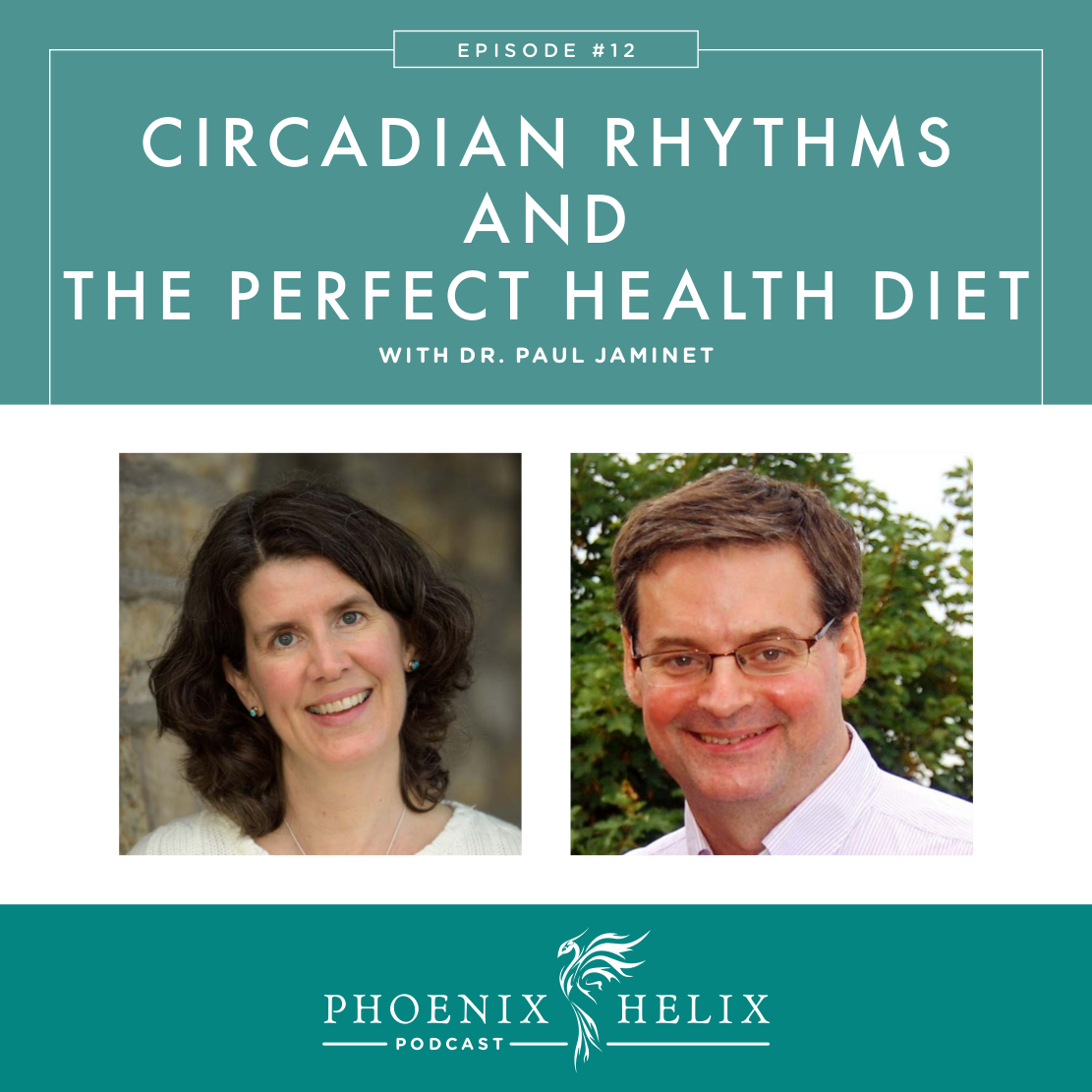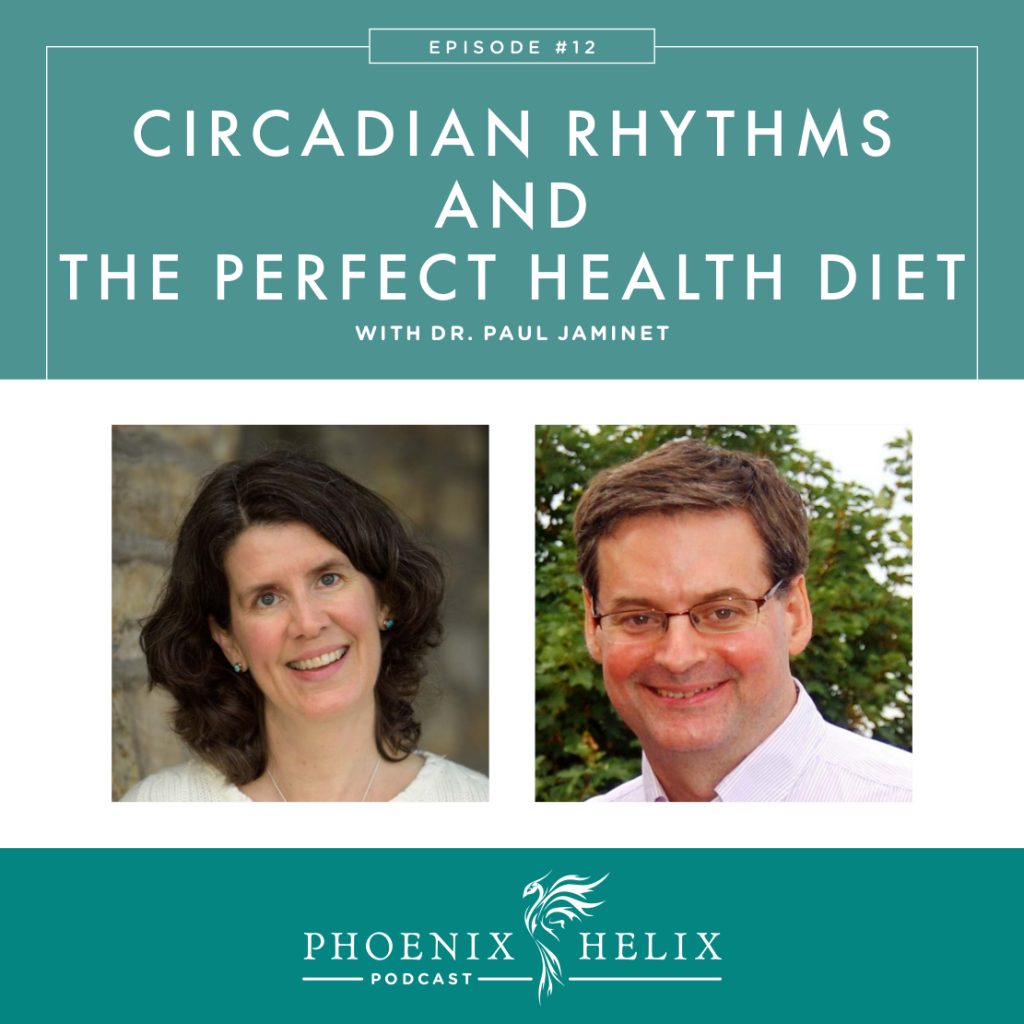Our Inner Clock Does So Much More Than Keep Time
Circadian Rhythms affect all aspects of health, from hormone balance, to metabolism, to our ability to sleep well at night, and most important of all – our ability to heal. You can see why this is such an important topic for those of us reversing autoimmune disease. In today’s podcast, I’m joined by Dr. Paul Jaminet, author of The Perfect Health Diet, and an expert on Circadian Rhythm Entrainment – harnessing our internal clock to heal.
We also talk about his dietary protocol in detail, why he recommends eating white rice, and how infections relate to autoimmunity.
Listen to the Show
- Subscribe to my podcast through your favorite podcast app: iTunes, Stitcher, Google, TuneIn, Spotify, Amazon, etc.
- You can also listen to the episode right here through the player below, and if you subscribe to my newsletter you’ll get notified of future episodes.
Podcast: Play in new window | Download
Show Notes
- Intro (0:00)
- Meet Paul (0:51)
- An astrophysicist who put his scientific mind to work in the paleo community, he is the author of The Perfect Health Diet. He has a fascinating healing story, because a fungal infection actually mimicked autoimmune symptoms for years. When he discovered and treated the infection, his symptoms disappeared.
- What is the Perfect Health Diet (PHD)? (6:43)
- An ancestral diet similar to paleo with some key differences.
- It emphasizes the importance of healthy carbohydrates for nutrition, energy levels, and microbiome health. Paul warns against eating too low-carb for too long. PHD recommends 1 pound of safe starch daily and 1 pound of sugary vegetables and/or berries daily. This recommendation stirred up some controversy in the low-carb paleo community. Check out the video: The Safe Starch Debate.
- Whereas paleo is a grain-free diet, PHD includes white rice in the safe starch category.
- It allows some dairy, more as a condiment than a major food category.
- It also includes supplement recommendations.
- Here’s a link to the PHD Food Diagram.
- Common Symptoms of Going Too Low-Carb (13:46)
- Downregulated thyroid hormone, resulting in hypothyroid symptoms.
- Downregulated mucus/saliva/tear production, resulting in dry eyes, nose and mouth.
- Fungal, yeast and parasite overgrowths.
- Vitamin deficiency.
- Why Is White Rice Recommended on The Perfect Health Diet? (16:21)
- Whereas grains have evolved to inhibit digestion, those anti-nutrients are located primarily in the husk of a grain, and white rice has had the husk removed.
- White rice is an easily digested carbohydrate for the body that can also be a form of resistant starch (food for the microbiome).
- For people ready to start reintroducing foods on the AIP, Paul recommends cooking rice in a pressure cooker, because that’s the most thorough method of removing anti-nutrients from a grain. My favorite pressure cooker is the Instant Pot, which actually has a rice setting, and there are two rice recipes included in the Extras section of The Paleo AIP Instant Pot Cookbook.
- Resource article: What’s Up With White Rice?
- Diagnosing and Treating Infections That Can Mimic or Complicate Autoimmune Symtpoms (20:47)
- Paul had a fungal infection that caused skin discoloration, and a bacterial infection that caused neurological symptoms. When he went to a conventional doctor, his tests all came back normal, so he did his own research online and discovered that Chlamydia Pneumoniae is a common chronic infection that can cause neurological symptoms and responds well to antibiotics. He talked his doctor into the correct antibiotic prescription, and his neurological symptoms vanished.
- Standard bloodwork can often hint at underlying infections. A functional medicine practitioner can interpret those results for you. One example is that parasite infections will lower LDL while bacterial infections will raise it. Infections will also affect white blood cell counts and can be an underlying cause of anemia.
- What Are Circadian Rhythms? (31:33)
- Our body has an internal 24-hour clock. Different body functions happen at different times of day, and our internal clock tells our body what to do when, and ensures that all of our cellular needs are accomplished.
- Daytime is meant for physical activity, social interaction, intellectual stimulation and decision-making. Nighttime is meant for relaxation and sleep, where our body repairs itself.
- If we stay in a high-stress state, it can throw our circadian rhythms off and make our body think it’s daytime 24 hours a day, and health problems result.
- Other factors that affect circadian rhythms (positively or negatively) are light exposure, physical activity, temperature, social interaction, when we eat, and when we sleep. There’s a time of day each of these activities is meant to happen, and if we reverse that, health problems result. Modern life has it reversed.
- How To Establish Healthy Circadian Rhythms (36:27)
- Set up your external environment to make it easy.
- Set up two sets of lighting: red/orange for nighttime use, and bright blue light bulbs for daytime use. Alternately, wear amber glasses at night.
- Set up a 12-hour day/ 12-hour night habit. Eat, work, socialize, get outdoors and exercise during the day. Relax, wind down, and sleep in a cool room at night.
- Television: OK during the day, but avoid it at night.
- Our bodies like routine. Make healthy circadian rhythms a habit.
- Set yourself a Sleep Challenge.
- Resource: Podcast Ep. 212: Morning & Bedtime Routines.
- Troubleshooting When External Factors Prevent You From Sleeping Well (49:55)
- Having a baby: By taking the same steps listed above, you can set your baby’s circadian rhythm to be healthy, where they are awake more during the day and sleep more at night. It’s also a good idea to extend your sleep time to make up for the time you are waking up to feed your baby at night.
- Autoimmune symptoms: If pain or other factors make it difficult to sleep, focus on relaxation as your goal. Using pillows as bolsters to support arms and legs can take some pressure off painful joints, making sleep more comfortable. If you have to get out of bed, don’t engage in daytime activities (avoid TV, the computer and food). Instead, take a bath, meditate or read a book, and go back to bed as soon as you feel able.
- Perfection isn’t the goal. Just do the best you can to support health in as many areas of your life as possible. As you heal (or as your baby gets older), trust that your ability to sleep will improve.
- A Future Book by Paul on Autoimmune Disease (57:25)
- Because autoimmunity is so complex and individualized, Paul envisions a book that isn’t a single protocol for everyone to follow, but rather a troubleshooting guide, where a certain set of symptoms would lead to recommended tests, self-experiments or treatments.
- One example is Paul’s controversial blog post, suggesting that pork and red meat consumption can lead to Hashimoto’s disease (but not other autoimmune diseases). For example, the same study showed no correlation between pork/red meat and rheumatoid arthritis. Note: this isn’t a proven theory, but just a hypothesis at this point.
- Outro (1:02:49)
- You can keep up with Paul’s work through his blog, Perfect Health Diet. There, you can find information on the PHD Retreats, as well as Paul’s ongoing research. For complete information on his protocol, check out his book, and he and his wife are currently working on its companion cookbook.
- Eileen (your podcast host) is the author of multiple books, written to help people thrive with autoimmune disease. Learn more on the Books Page.
- If you like this podcast, follow or subscribe through your favorite podcast app. You can also subscribe to Eileen’s biweekly newsletter.
- Check out the entire archive of podcast episodes.
You May Also Be Interested In
Spreading the Word
If you like the podcast, please leave a positive review in iTunes. It would mean the world to me, and also helps others find the podcast. Here are some quick instructions using your iPhone:
- If you are already subscribed to my podcast: (1) Click the purple podcast icon. (2) At the bottom of the screen, click Library. (3) At the top of the screen, click Shows. (4) Click the Phoenix Helix podcast image. (5) Scroll down the page, and you’ll see Ratings and Reviews. Scroll down a little bit more and click on Write a Review. This will bring up the review screen. Tap 5 stars (if you love the podcast), and then click in the title box, and it will bring up the keyboard. Enter a title and short review. (6) Click Send in the upper right corner. (7) Thank you! Positive reviews give the podcast a higher search ranking in iTunes, helping people find it and letting them know it’s a quality podcast and worth their time to listen.
- If you haven’t subscribed to my podcast: (1) Click the purple podcast icon. (2) In the lower right corner, click the magnifying class. (3) Type Phoenix Helix in the search box. (4) Click the podcast cover in the Show list. (5) If you’d like to subscribe, click the + sign at the top of the screen. (6) To write a review, scroll down the page, and you’ll see Ratings and Reviews. Scroll down a little bit more and click on Write a Review. This will bring up the review screen. Tap 5 stars (if you love the podcast), and then click in the title box, and it will bring up the keyboard. Enter a title and short review. (7) Click Send in the upper right corner. (8) Thank you! Positive reviews give the podcast a higher search ranking in iTunes, helping people find it and letting them know it’s a quality podcast and worth their time to listen.










I found the Phoenix Helix while searching itunes podcasts for autoimmune info. I just love this podcast and have learned so much about AI diseases, my particular struggles and the AIP! After being so discouraged for so long because I didn’t fit into the box of traditional specialists, I have definitely found hope and resources here. I love Eileen’s style and how she always asks the same 3 questions of her guests, because really, that’s what we want to know from the get go! Thank you for what you’re doing and for the validation received by those who are suffering!
Jeanne, you made my night! This is why I started the podcast. Wishing you healing on every level.
Thanks Eileen! I also love how you get straight to the topic at hand on every podcast 🙂 Keep up the excellent work. I’m certain you are helping many people!
This is really helpful Eileen. I have started looking into Paul Jaminet and the PHD. I’m on day 20 of AIP and will have to make changes due to too rapid weight loss (I was already too thin). I have been feeling weak and shaky for more than a week. After hearing this, I suspect that I have been eating too low carb. I’m trying to increase fat and portion size with each meal and today I ate rice. I felt stuffy headed after the meal with rice, but it could be the ghee which doesn’t sit well with me lately. Coconut oil is out and so is olive oil since I have become very sensitive to them as well. Right now I’m using canola. I know it isn’t perfect, but I take heart in Paul’s comment about making as many positive changes as possible and hoping to tip the balance towards healing. Clearly AIP is helping in some way, but it is also hurting the way I am implementing it. There was so much in this interview that I will follow up on, particularly the discussion of circadian rhythms and the possible link between beef and pork and Hashimoto’s. I have become intolerant to beef and pork. Your site has become a valued resource and I am greatly appreciative of your work.
Claire, it sounds like this podcast aired at the perfect time, which makes me very happy! Each of us personalizes our healing protocol, and it sounds like you have lots of insight into what to try next. Thanks so much for commenting. Wishing you healing on every level!
Eileen, you are a great interviewer. Thank you for this interview–very informative.
It’s a pleasure, Jennifer. And thank you for the compliment!
I have skin problems on my face. Whiter areas and darker rosacea type redder areas. I have no idea what it is or what is causing it. How can I find out. I’ve had it a few years after the birth of my first child. Dietary changes such as GAPS and now started PHD have not done anything to improve my skin.
Hi Claire. Your best bet is to work with a functional medicine practitioner. Here’s a list of options: http://www.phoenixhelix.com/2013/05/05/personalizing-nutritional-healing-for-your-specific-needs/